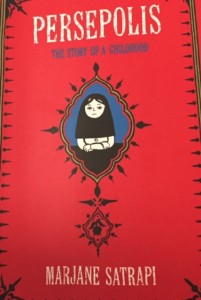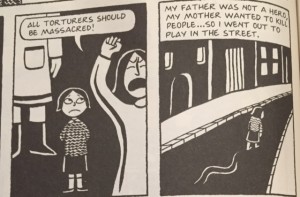Welcome back readers!
So this week in our ASTU class we’ve been reading and discussing the graphic memoir Persepolis by Marjane Satrapi.
It is the auto biographical story of Satrapi’s life as a young girl growing up in Iran during and after the revolution in 1979. In the introduction Satrapi explains that one of her reasons for wanting to share her story is to show the world what life in Iran was like for her and her family, and to show people that the way her country has been perceived by the West is “far from the truth”.
Because Persepolis is “the story of a childhood” and not simply about war and terror, there are many experiences that Satrapi goes through that we can all relate to on some level. Some examples would be when she smokes her first cigarette to rebel agains her mother on page 117, or when she asks her parents to bring posters of her favorite musicians back from their vacation and hangs them up in her bedroom on pages 126-131. Although her experiences are different and generally far more extreme, we can all relate to listening to new music, falling in love with a new band or rebelling against our parents in one way or another. I think the fact that we can connect to Satrapi’s experiences makes her story even more powerful. It makes us stop and think about just how different we aren’t.
There was one passage in particular that really made me stop and think for a moment. On the bottom of page 52 we see a frame of Satrapi’s mother shouting “All torturers should be massacred!” and in the next frame we see a young Satrapi walking alone with the caption “My father was not a hero, my mother wanted to kill people… so I went out to play in the street”.
This is a very extreme example, but it made me think about those moments that people always talk about when you see for the first time that your parents are actually people with lives outside of just being your mom and dad.
I personally can’t really remember that exact moment of realization in my life, so I looked around online for posts people have made about having that experience, and found this really cool blog post that I thought described what these frames made me think about really nicely. It’s called The First Time I Realized My Parents Were Human by Sherry Levine. She wrote “As people I realized, they must have regrets, insecurities and fears just like I do and will when I’m older. . . Between body changes, perception changes and new obstacles to face, every year to them is just as new as every year to us”.
Though having your mother express thoughts about wanted people to be killed is not the most common experience (I hope), I think everyone has these moments of “whoa, did my mom really just say that?!” or “my parents think that way?!” where it kind of occurs to you that they have this whole other side that you haven’t really seen or gotten to know yet, as your relationship hasn’t yet developed beyond parent and child.
Anyway, that’s just a thought I had while doing the reading this week! Hopefully some of you know the feeling I’m talking about.
Thanks for reading.
Olivea

